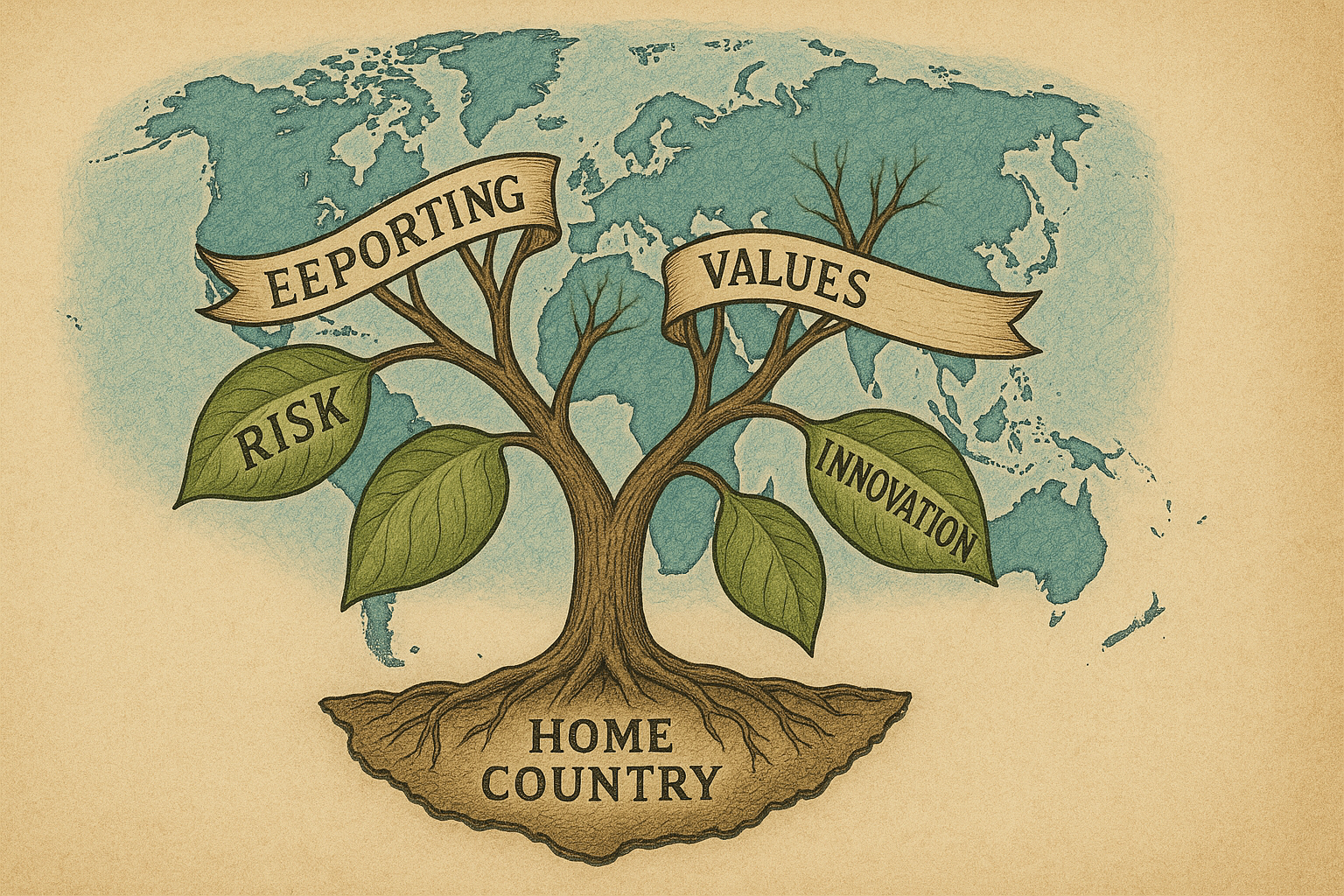What is the role of millennials in the internationalization of a family business?
Alessandro Cirillo, Barbara Maggi, Salvatore Sciascia, Valentina Lazzarotti, Federico Visconti
Audio > Play / Stop
CeFEO's Authors
CeFEO counts more than 50 scholars and 30 affiliated researchers. Several studies and reports have consistently identified CeFEO as a leading research environment worldwide in the area of ownership and family business studies.
This research project, has been co-authored by the following CeFEO Members.

Alessandro Cirillo
Affiliated Researcher
Reference
Spotlight highlights research-based findings only. If you’re interested in exploring this project further or delving into the theoretical and methodological details, we encourage you to contact the authors or read the full article for a comprehensive understanding.

Cirillo, A., Maggi, B., Sciascia, S., Lazzarotti, V., & Visconti, F. (2021). Exploring family millennials’ involvement in family business internationalization: Who should be their leader? Journal of Family Business Strategy, 13(3), 100455.
https://doi.org/10.1016/j.jfbs.2021.100455

What is Spotlight?
Spotlight is an innovative online family business magazine designed to bridge the gap between cutting-edge research and the real-world needs of practitioners, owners, and policymakers. Drawing on the latest findings from the Centre for Family Entrepreneurship and Ownership (CeFEO) at Jönköping International Business School, Spotlight delivers insightful, accessible summaries of key research topics. Our mission is to keep the family business community informed and empowered by offering actionable insights, expert analyses, and forward-thinking strategies that enhance business leadership and ownership practices for long-term success.

This article is brought to you by the WIFU Foundation
Spotlight is generously supported by the WIFU Foundation, which promotes research, education, and dialogue in the field of family business. This partnership enables us to continue bridging academic insights and real-world practice for the advancement of responsible family entrepreneurship and ownership.
How do millennials help family businesses to go global?
As family businesses face the challenges of global competition and generational transition, millennials are stepping up to shape the future. But when it comes to international expansion, who should lead the charge: the founder or a non-family CEO? This study explores how millennial family members become involved in their family firm’s internationalization process and how different leadership models impact their engagement. The findings help family firms reflect on how to structure leadership to empower younger generations and foster international growth.
As family businesses face the challenges of global competition and generational transition, millennials are stepping up to shape the future. But when it comes to international expansion, who should lead the charge: the founder or a non-family CEO? This study explores how millennial family members become involved in their family firm’s internationalization process and how different leadership models impact their engagement. The findings help family firms reflect on how to structure leadership to empower younger generations and foster international growth.
In an increasingly globalized world, internationalization is a critical growth path for family businesses. But expanding beyond domestic markets introduces not just financial or strategic challenges—it raises deep questions about who should lead, how family dynamics shape strategic decisions, and what role millennials play in this transformation.
Millennials, defined roughly as those born between 1981 and 1996, are reaching maturity in a time of rapid digital change, geopolitical complexity, and shifting consumer expectations. Their values, work preferences, and global mindset differ significantly from those of their parents or grandparents, who may still lead the family firm.
This study explores a crucial intersection: millennial involvement in the internationalization of family businesses—and more specifically, who facilitates their involvement. Should this be the founder, whose deep knowledge and legacy command loyalty? Or is a non-family CEO better equipped to open space for new generations to thrive globally?
What We Studied
The researchers conducted a qualitative multiple-case study involving ten Italian family SMEs operating in international markets. In each case, they focused on:
- The presence and role of millennial family members
- The leadership structure—whether the business was still led by the founder or a non-family CEO
- The level and nature of international engagement by the next generation
Data were collected through semi-structured interviews with both senior and next-generation family members, complemented by document reviews and secondary data.
The goal was to uncover how different leadership configurations impact millennials’ actual involvement in internationalization—not just their attitudes or aspirations, but their day-to-day roles and influence.
Key Insights
1. Millennials Want to Contribute to Internationalization
Millennials in family businesses show a strong interest in global markets, often viewing internationalization as:
- A personal growth opportunity
- A way to modernize and professionalize the business
- A chance to align the firm with global values, such as sustainability and innovation
They tend to bring skills in languages, digital marketing, and intercultural communication—key assets for expanding abroad.
2. Leadership Structure Shapes Next-Gen Engagement
The study highlights two main leadership configurations:
a. Founder-Led Firms
When the founder remains CEO, they may either:
- Empower millennials by giving them responsibility in international projects (e.g., leading a foreign market entry or attending global trade shows), or
- Restrict involvement by retaining tight control, particularly if they view the younger generation as inexperienced
Interestingly, founder-led firms tend to involve millennials earlier, often through informal mentoring or trial-and-error experiences.
b. Non-Family CEO-Led Firms
In firms led by professional non-family managers:
- Millennials are more likely to receive structured roles and responsibilities, such as export coordination or digital strategy
- The involvement is typically more formalized and aligned with performance metrics
However, these CEOs may lack the familial authority to encourage long-term commitment, especially if trust or alignment with family values is weak.
3. Leadership Style Matters as Much as Structure
It’s not only who leads but how they lead that makes the difference. Effective leaders—whether founders or outsiders—tend to:
- Mentor and coach millennials rather than micromanage them
- Encourage innovation, even if it means taking risks
- Allow room for autonomy and fresh ideas
- Value the younger generation's global mindset
In contrast, rigid or hierarchical leadership—regardless of who it comes from—tends to limit next-gen engagement in international initiatives.
Takeaways for Family Business Owners
1. Engage Millennials in Meaningful Roles
Involving younger family members in tasks like export development, digital strategy for international markets, or partner scouting empowers them while adding real value to internationalization efforts.
2. Adapt Leadership Styles to Encourage Growth
Founders must shift from directive to collaborative leadership if they want to unlock millennial potential. Non-family CEOs, on the other hand, must build trust and cultural understanding to align with family values.
3. Build Bridges Between Generations
Internationalization is a long-term journey. Establishing cross-generational teams or innovation task forces can foster both skill development and succession readiness.
4. Invest in International Learning Paths
Encourage millennial family members to study, work, or intern abroad. Their global exposure will feed directly into the firm's internationalization capacity.
Impact
This study challenges simplistic succession narratives. It shows that millennial involvement in internationalization is not automatic—it is shaped by leadership choices and cultural dynamics. Whether led by a founder or an external CEO, the business must cultivate intentional leadership practices to empower the next generation.
For family businesses looking to expand abroad while ensuring continuity, this research underscores a key insight: intergenerational collaboration is a strategic asset, not just a succession formality.
Recommendations
- Assess your current leadership model: Is it empowering the next generation to explore and execute international strategies?
- Provide mentorship, not micromanagement: Leaders must serve as guides, not gatekeepers.
- Include millennials in strategic discussions about global markets—not just operational roles.
- Encourage feedback loops between older and younger generations to enhance mutual learning.

CeFEO's Authors
CeFEO counts more than 50 scholars and 30 affiliated researchers. Several studies and reports have consistently identified CeFEO as a leading research environment worldwide in the area of ownership and family business studies. This research project, has been co-authored by the following CeFEO Members.

Alessandro Cirillo
Affiliated Researcher
Reference
Spotlight highlights research-based findings only. If you’re interested in exploring this project further or delving into the theoretical and methodological details, we encourage you to contact the authors or read the full article for a comprehensive understanding.

Cirillo, A., Maggi, B., Sciascia, S., Lazzarotti, V., & Visconti, F. (2021). Exploring family millennials’ involvement in family business internationalization: Who should be their leader? Journal of Family Business Strategy, 13(3), 100455.
https://doi.org/10.1016/j.jfbs.2021.100455

What is Spotlight?
Spotlight is an innovative, AI-powered, online family business magazine designed to bridge the gap between cutting-edge research and the real-world needs of practitioners, owners, and policymakers. Drawing on the latest findings from the Centre for Family Entrepreneurship and Ownership (CeFEO) at Jönköping International Business School, Spotlight delivers insightful, accessible summaries of key research topics. Our mission is to keep the family business community informed and empowered by offering actionable insights, expert analyses, and forward-thinking strategies that enhance business leadership and ownership practices for long-term success.

This article is brought to you by the WIFU Foundation
Spotlight is generously supported by the WIFU Foundation, which promotes research, education, and dialogue in the field of family business. This partnership enables us to continue bridging academic insights and real-world practice for the advancement of responsible family entrepreneurship and ownership.










